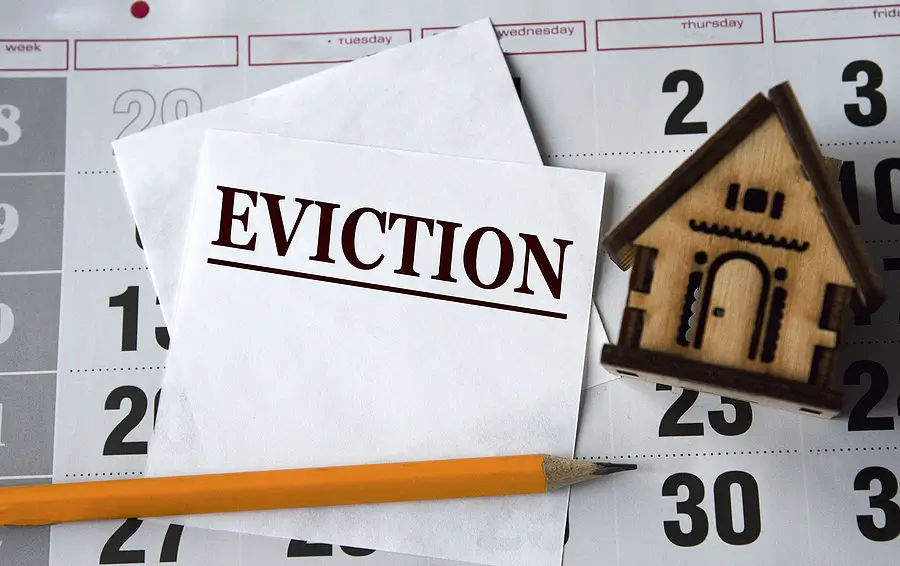If managing and screening tenants feels as intricate as playing a well-strategized game of Monopoly, you know the importance of understanding all the rules.
Dealing with evictions can feel like navigating a legal minefield, but with a firm grasp of the eviction process, you, as a landlord, can confidently steer through Georgia's requirements.
This guide walks you through the complexities of eviction proceedings, ensuring your rental properties remain profitable and legally secure.
The Importance of Understanding Georgia Eviction Laws
Successfully navigating the Georgia eviction process starts with a solid understanding of Georgia eviction laws.
Whether you're addressing overdue rent or lease violations, Georgia law outlines the steps required to protect landlords and tenants.
Non-compliance with these laws can delay or even dismiss your eviction case.
Issuing a Written Notice to the Tenant
The process begins with a written notice, which serves as formal communication about the tenant's violations. This step could include a lease violation notice for breaches of the lease or a rent demand notice for unpaid obligations.
Georgia state law demands adherence to the required notice period, ensuring tenants have sufficient time to address the issue or vacate.
Taking the Legal Process to the Next Step
If a tenant refuses to comply with the notice, the next step is to file an eviction lawsuit in the magistrate court.
Highlight the tenant's failure to pay rent or other issues explicitly in your filing, ensuring your lease agreement, payment records, and other documentation align with state-regulated guidelines.
Filing improperly could result in the court invalidating your efforts.
Understanding the Georgia Eviction Timeline
Once the landlord files the eviction paperwork, the Georgia eviction timeline begins. The tenant typically has seven days to respond.
If the tenant fails to provide a legal defense, you may receive a default judgment in your favor, quickly moving the case forward.
However, if disputes arise, the case enters legal proceedings, which can extend the timeline.
Navigating a Court Hearing and Legal Defense
If the tenant disputes the eviction, the court hearing becomes the focal point of the eviction process in Georgia. During the hearing, the landlord and the tenant must present evidence.
This presentation often includes the lease or rental agreement, proof of unpaid rent, or damages to the rental unit.
If the landlord wins, the judge issues a writ of possession, granting the landlord legal authority to reclaim the vacant property.
Enforcing the Writ of Possession
Landlords can take back their residential property once the writ of possession is issued.
This step may require law enforcement assistance to remove tenants, especially if they haven't vacated voluntarily. Adhering to court rules ensures a smooth actual eviction process.
Handling Tenant Belongings After the Eviction
Evictions don't simply end when a tenant leaves. Often, tenants abandon personal property, and you must handle their personal belongings according to Georgia state law.
Avoid disposing of items prematurely to prevent disputes. Ensure you follow legal steps to avoid potential lawsuits.
Implementing Steps to Avoid Evictions
Evictions are stressful, so adopting measures to avoid eviction scenarios is key. Strengthening your rental agreement with clear lease terms about rent payments and tenant responsibilities can reduce conflicts.
Improved tenant screening processes and fostering better communication also minimize issues like failure to pay rent or property damage.
The Role of Legal Counsel in Eviction Cases
Working with experienced legal counsel can significantly ease the legal process of handling evictions. From filing the case in the magistrate court to navigating disputes, a reliable attorney ensures compliance with fair housing laws and reduces the chance of costly legal errors.
Be Skillful When Managing Evictions in Georgia
Rent Appeal will help you stay informed about Georgia's eviction laws and guide you in understanding the court process to protect your investments and improve tenant relationships.
Whether you're dealing with unpaid rent, lease violations, or other tenant disputes, a proactive approach, attention to detail, and our eviction protection service will help you navigate the eviction timeline gracefully.
FAQs
1. What is the first step in the eviction process?
The eviction process begins with the issuance of a written notice. Depending on the tenant's violation, this notice could be a formal eviction notice or a rent demand notice. Georgia law requires strict adherence to notice periods.
2. What happens if the tenant disputes the eviction?
A tenant dispute can lead to a court hearing, during which the evidence presented by both the landlord and tenant will be reviewed. Supporting documentation, such as the lease agreement, proof of overdue rent, and photos of property damage, plays a critical role in the outcome.
3. How long does the Georgia eviction process take?
The Georgia eviction process timeline depends on the specifics of the case. If the tenant fails to respond, it may take only a few weeks. However, disputes or appeals can extend the process.
Other Resources:
Top 5 Best Atlanta Neighborhoods for Real Estate Investing in 2025
Competing for Top Tenants with Next Level Rental Marketing Techniques


